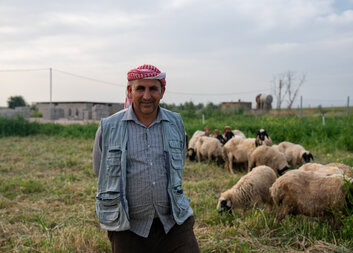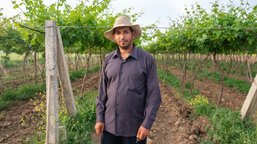For centuries, the fertile Nineveh Plains in Iraq have provided an ideal place to farm. Until climate change began to hit the area hard. It is also affecting farmer Jibran, who is seeing his crops lost to drought and weather fluctuations. Caritas Czech Republic has supported Jibran to be able to farm despite the changing climate.
Harvesting in spite of climate change
The peace and quiet in the fields near the Iraqi city of Karakosh is disturbed only by the bells of grazing sheep. In front of them, farmer Jibran tells us his story. He was born into a family of farmers who have farmed the fertile Nineveh plains for generations. "Where we are standing, this whole region, is an agricultural area. That is why so many people here are involved in farming," Jibran explains. His family members help him at the farm too. "My family is poor, so I try to employ as many family members as possible," says the farmer. But agricultural work in Iraq is increasingly unstable due to climate change.
The morning sun is gaining strength and showing how hot the summer months can be in the town of Karakosh in Iraq. Jibran says the temperature is rising every year. "I don't know what will come in the next few years. I'm afraid the drought will destroy everything. Temperatures are constantly rising, it's usually 50 degrees here in the summer and in the future it may go even higher, it will completely destroy our crops," Jibran fears. "Without support, we wouldn't be able to farm successfully today. We need greenhouses and irrigation systems because climate change is affecting how we have farmed so far," the farmer adds.
Today, Jibran mainly grows wheat, but also tomatoes and cucumbers. These thrive in the greenhouse the farmer received from Caritas Czech Republic, along with training in modern farming methods. During the training, he learned, among other things, how to grow crops despite the changing climate or which drought-resistant seeds to plant. He also received an irrigation system from us, which means he does not have to rely on irregular rainfall.
"Thanks to the training, I learned when and how to start the season, how to take care of the soil, and how to irrigate properly so that the crops grow well," says Jibran. "I am eternally grateful to Caritas Czech Republic for your help. I always mention Caritas Czech Republic in my prayers and appreciate how you help us," the farmer adds.
Apart from farming, Jibran also raises livestock. For example, the sheep that graze peacefully in the surroundings. Jibran's next plan is also connected to animals. "I want to start growing new crops that will serve as food for my animals so I can have more of them," the farmer plans.
How Caritas Czech Republic is helping in Iraq
Caritas Czech Republic has long been helping people in disadvantaged regions adapt to the changing climate. In Iraq, we are looking for ways to mitigate the effects of desertification, conducting climate studies and helping Iraqi farmers to grow crops despite weather fluctuations. We introduce them to modern farming methods so they can learn how to grow and harvest crops even in challenging conditions. We provide farmers with modern irrigation systems, greenhouses and introduce them to drought-resistant seeds.
We are also helping with post-war reconstruction in Iraq. We provide grants and business skills training to people returning to their homes after being forced to flee the self-proclaimed Islamic State. As a result, they are able to rebuild or start their own businesses - for example, a carpentry workshop or a bakery.
We supported farmers in Iraq thanks to the financial assistance from Agenzia Italian Per La Cooperazione allo Sviluppo (AICS) in partnership with the Italian Agency Condivisione Fra i Popali (CFP).
We can also help thanks to our donors. Join and help with us.












